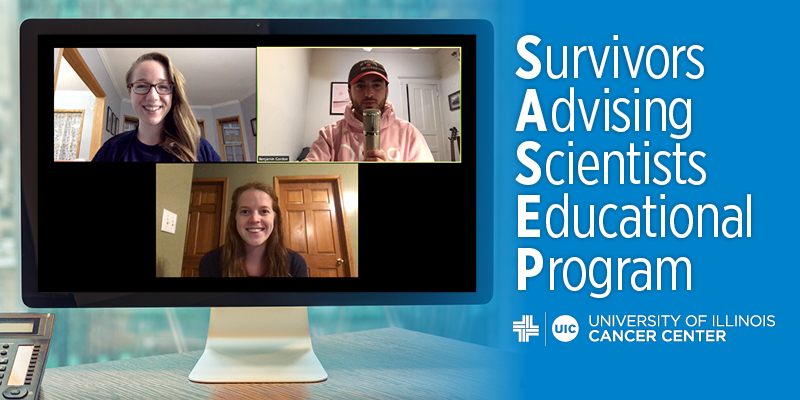
Scientists are searching for any way to find a cure for cancer, and who better to help them than those who have battled the disease.
University of Illinois College of Medicine MD/PhD students are teaming up with patient advocates to create an educational program that connects young investigators with cancer patients, survivors, research advocates, and allies to increase their scientific knowledge.
“Our goal is to bring everyone to the table for discussions related to the science of cancer and their therapies,” said Benjamin Gordon, a MD/PhD student who worked on the program with Kimberly Richardson, a research associate and advocate at the University of Illinois Cancer Center.
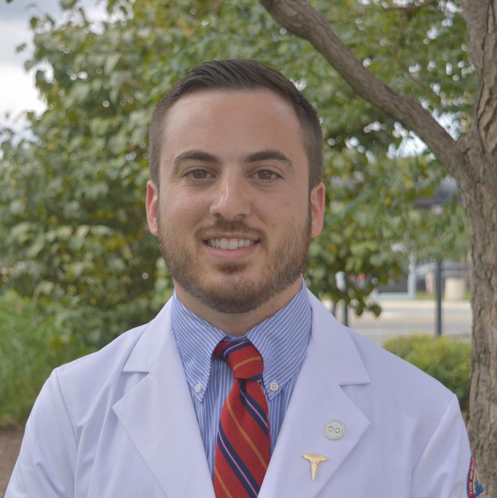
“Survivors Advising Scientists Educational Program” is a model developed by Richardson while she participated in the National Coalition for Cancer Survivorship’s ELEVATE Ambassador Program. Having little knowledge of cancer before being diagnosed with a rare form of ovarian cancer eight years ago, Richardson has since been transformed into a research advocate, learning anything she can about the disease. She wants to share her wisdom, along with scientists’ expertise, to create initiatives that foster meaningful collaborations between survivors and researchers.
“The training modules are the beginning of these types of alliances, and it was great working with these amazing MD/PhD students,” Richardson said.
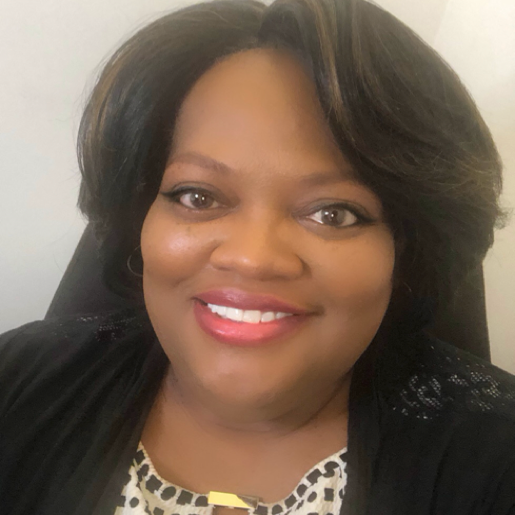
The program consists of nine eight to 12 minute video vignettes that are presented in a language that can be easily understood. Topics range from scientific hypotheses and its components; experimental and confounding variables; experimental errors; types of clinical studies; and how to read a scientific poster. The goal, Gordon said, is to create more content, especially as it relates to cancer treatment and health disparities.
Gordon was introduced to Richardson last year during a tour she organized for UI Cancer Center Patient Brigade members at the laboratory of Jan Kitajewski, PhD, acting director of the UI Cancer Center and professor of physiology and biophysics at the University of Illinois College of Medicine. A graduate student researcher in Kitajewski’s lab, Gordon witnessed the group’s thirst for information and curiosity about the work being conducted on tumor angiogenesis, cell fate determination, GPCR (G-protein-coupled receptors) signaling and pathway remodeling. The encounter left him inspired to become more involved in cancer patient advocacy.
“It made me realize how big of a barrier there has been historically between researchers and patients,” Gordon said. “But the encounter also gave me great optimism, because there was such motivation and potential to build a bridge between the bench and community after talking to Brigade members. This project will not only be beneficial to cancer patients and survivors, but to young investigators, who will get important exposure to community members and patients, which is especially vital for aspiring physician-scientists.”
Gordon and Richardson discussed how they could collaborate, and after formulating an outline for the program, they discovered they needed help. A member of the Medical Scientist Training Program’s Facebook page, Gordon related his experience with the Patient Brigade to his social media friends and asked if anyone was interested in assisting. Two additional MD/PhD students, Casey Blaha and Tova Bergsten, enthusiastically volunteered.
“I was in the middle of planning my thesis defense, but when I learned of the program I immediately thought about how wonderful the idea sounded,” said Blaha, who is mentored by Nissim Hay, PhD, professor of molecular genetics and biochemistry and co-leader of the UI Cancer Center’s Cancer Biology Program. “I was struggling to create my presentation for my target audience, many of whom were family and friends. I thought about the need to not only educate patients, but also the importance of researchers being able to clearly communicate and describe their work to patients. Finally, I thought about how important it is to learn from patients. We need to educate each other and help drive research together.”
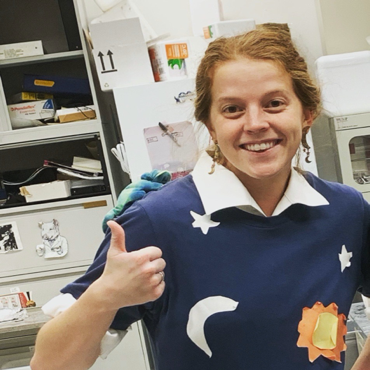
Gordon, Blaha and Bergsten began drafting the modules, with each researcher recording three segments. Patient Brigade members, along with other patient advocates, critiqued the pieces and provided feedback, which were incorporated into the final round of recordings. “We felt the comments from the patient advocates greatly enhanced the clarity of the videos,” Blaha said.
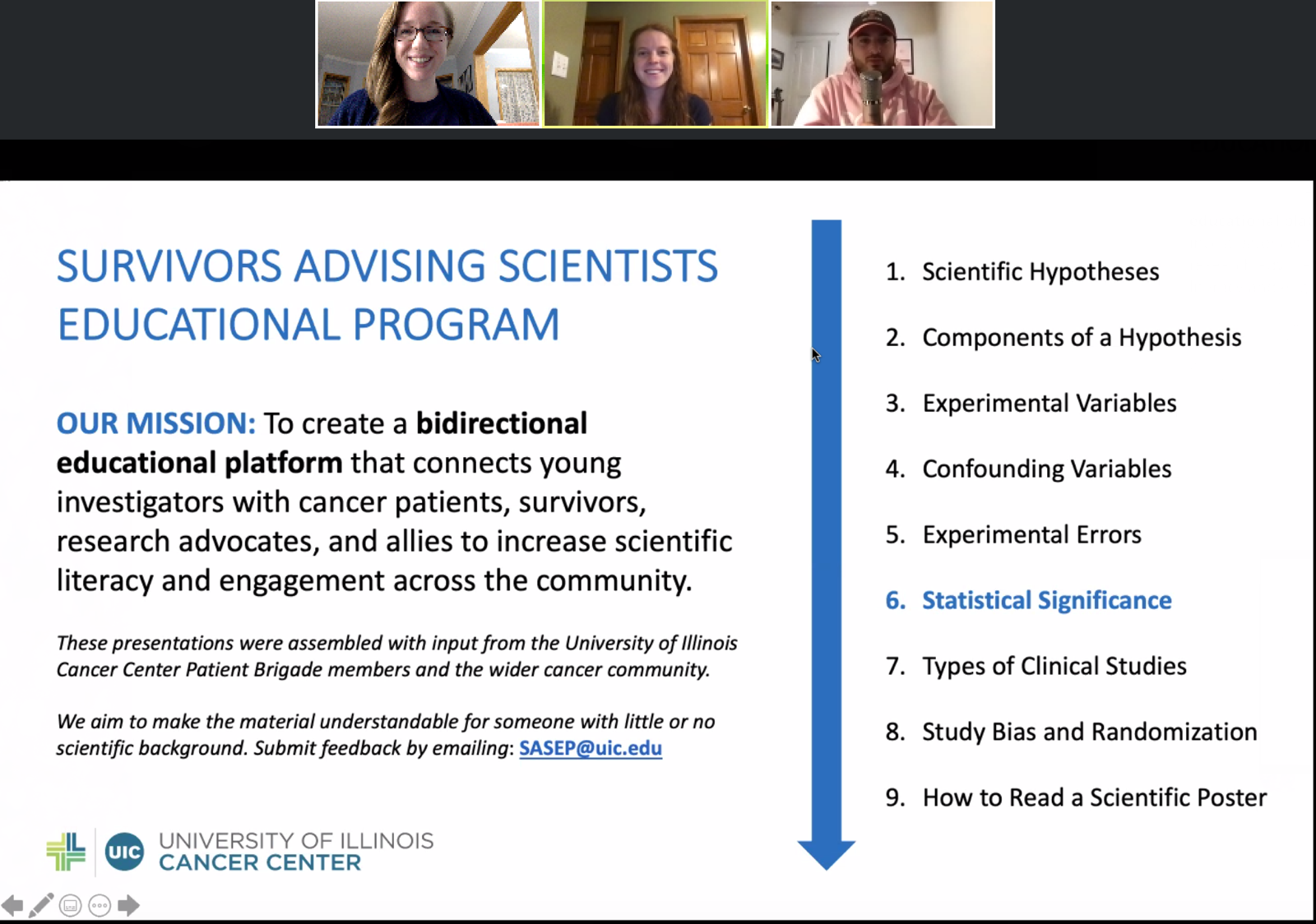
A member of the laboratory of Joanna Burdette, PhD, professor of pharmaceutical sciences and Associate Dean for Research and Graduate Programs in the UIC College of Pharmacy, and a member of the UI Cancer Center’s Cancer Biology program, Bergsten met Richardson last year when a group of ovarian cancer survivors toured the facility.
“The meeting was invigorating to me, and inspired me to learn from my patients so I can become a better physician-scientist,” Bergsten said. “I also have a strong interest in education, so the opportunity to create something that will allow me to learn from patients and enable them to engage with the research community was too enticing to miss.”
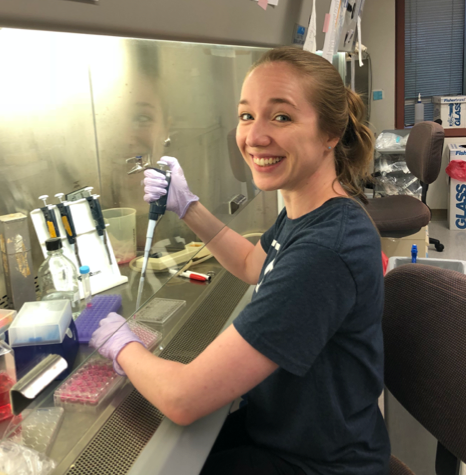
The finished product can be accessed through the UI Cancer Center and CancerNet website. The American Society of Clinical Oncology (ASCO) is also interested in including it on their site prior to the organization’s virtual annual meeting, which begins on Friday, May 29.
Working on a project such as the “Survivors Advising Scientists Educational Program” so early in her career has been “incredibly rewarding,” Bergsten said. “It’s not only been a delight to work with passionate students and professionals, but being able to involve patients at the core of this work is so unique. Creating something and being able to hear directly from patients in what they find more helpful and working towards that goal, that’s what our field is all about.”
